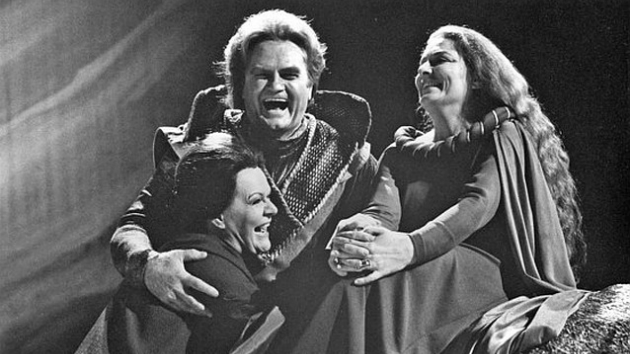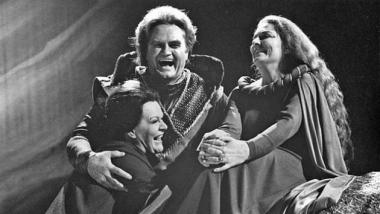
"Out of character for me," says a prominent, veteran San Francisco opera fan and contributor, "but after his last Peter Grimes, I waited alone for 90 minutes outside Jon Vickers' dressing room just to shake his hand and say 'thank you'."
Along with the fan who didn't want her name used, there are zillions of opera fans around the world mourning the passing of one of the greatest tenors in history. After a lifetime of leading companies, S.F. Opera General Director David Gockley responded with an unqualified superlative when asked for his comment on Vickers' death: "The most intense, formidable operatic artist in my memory."
The news came Saturday, in an announcement from his family:
It is with great sadness that we announce the passing of our father, Jon Vickers, after a prolonged struggle with Alzheimer’s disease. He is survived by one sister, his five children, 11 grandchildren, and two great grandchildren.
His family and dearest friends remember him for his ringing laughter, warmth, and generous spirit. A man of the land who was the most at home on his farm, surrounded by nature and his family, he had an abiding search for the truths and essences of life.
Vickers was born Oct. 29, 1926, in Prince Albert, Saskatchewan. From the small, rural town, he went on to become a celebrated tenor, performing in the world's major opera houses the most demanding of roles, such as Tristan, Siegmund, Parsifal, Otello, Aeneas, Peter Grimes, and many more.
The Royal Opera House obituary over the weekend speaks of Vickers' "searing vocal intensity and powerful dramatic interpretation... powerful stage presence and his deeply thoughtful characterizations. He possessed a uniquely powerful and distinctive voice, which when combined with his superior acting ability, made him one of the most exciting operatic artists of his time."
Long before he became a celebrated heldentenor of his time, Vickers shone as a lyric tenor in roles such as Don José of Carmen and as Federico in the rarely-performed Cilea opera, L'Arlesiana.
San Francisco Opera was lucky to have many appearances by Vickers, thanks to the formidable head of the company, Kurt Herbert Adler, who cast him as Radames in a 1959 Aida. That was the same year Vickers made his Vienna debut, and a year before his Met debut as Canio in Pagliacci. In the next 17 years, Vickers sang in more than a dozen productions in the War Memorial (and on tour), from Don José to Siegmund in Die Walküre, ending with Peter Grimes in 1976.
Adler was famous for ruling with an iron hand and if he had a dispute with an artist, that was the end of the singer's San Francisco career, or, in case of Maria Callas, a career that never started. And yet, Adler made an exception with Vickers who walked out during rehearsals of what would have been his debut as Tristan in 1970. Adler replaced him with Wolfgang Windgassen and ignored the tenor for years, but in 1976, he engaged him as Grimes and Siegmund.

